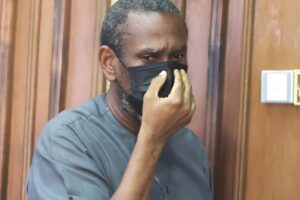Renowned Nigerian journalist and broadcaster Rufai Oseni recently ignited a social media storm with his candid confession on his X handle. He revealed that his extensive career in media has been so diverse that he struggles to remember all the organizations he has worked with. Highlighting some of his notable stints, Rufai Oseni mentioned his time at Unique FM Ilesha and Goldman Ilesha. He also shared his experience as a political analyst for BBC Radio in Bristol and Gloucestershire, showcasing the breadth of his professional journey across different platforms and roles.
Rufai Oseni’s revelation attracted mixed reactions, with many hailing it as a testament to his versatility and resilience in the fast-paced media industry. Admirers lauded his ability to excel in various capacities, viewing it as a reflection of his dedication to journalism. However, not everyone was impressed. Skeptics questioned the authenticity of his claims, suggesting that such a fragmented career path could indicate a lack of focus. This duality of responses has sparked a broader conversation about the value of specialization versus adaptability in today’s competitive media landscape.
Rufai Oseni Faces Criticism for Career Diversity: “Jack of All Trades?”
Rufai Oseni’s revelation about his extensive media career sparked a divisive reaction online, with a notable critique coming from X user @Sirlablu. The user commented, “Sounds like Jack of all trades, master of none to me. You know, like a shining knife but just not the sharpest one in the drawer!” This remark quickly gained momentum, resonating with critics who argued that Oseni’s varied career might signal a lack of depth or specialization. In the highly competitive field of journalism, where expertise often determines credibility, such diversity was viewed by some as a potential weakness rather than a strength.
Despite the criticism, Rufai Oseni’s supporters defended his career choices, emphasizing the importance of adaptability in modern media. They argued that the ability to succeed across various platforms and roles reflects a dynamic skill set suited to today’s rapidly changing industry. For these advocates, Rufai Oseni’s wide-ranging experience is not a flaw but a strength, showcasing his capacity to evolve and excel in a field that demands both versatility and resilience. This clash of perspectives highlights an ongoing debate about the value of being a generalist versus a specialist in the digital age.
Supporters Praise Rufai Oseni’s Versatility
Despite the backlash, many of Oseni’s followers came to his defense, applauding his ability to excel across multiple platforms and regions. For them, his achievements at BBC Radio and other international gigs are proof of his talent and determination.
One user commented, “ Rufai Oseni’s career trajectory is inspiring. It shows that he has the ability to thrive in diverse environments, which is what the media industry needs now more than ever.” Another user added, “Rufai Oseni’s versatility is his strength, not a weakness. Critics need to recognize that the world is moving away from rigid specialization.”
The Bigger Picture: Media Careers in Focus
Rufai Oseni’s revelations reignite the ongoing debate about whether being a generalist or a specialist is better in the media industry. With the rise of digital platforms and diverse audiences, some argue that professionals like Oseni embody the future of media—where adaptability reigns supreme.
However, others insist that deep expertise in a specific area is irreplaceable, particularly in investigative journalism and specialized reporting. Oseni’s case serves as a microcosm of this larger professional dilemma, making it a talking point among media experts and enthusiasts alike.
Rufai Oseni Responds to Criticism
In a follow-up tweet, Rufai Oseni addressed the criticisms head-on, stating, “My career has been about passion and growth. If that means exploring various media opportunities, so be it. Success isn’t linear.” His response garnered mixed reactions, with some applauding his resilience and others dismissing it as an excuse.
This statement suggests that Rufai Oseni is unfazed by the negative comments, focusing instead on his personal and professional development. It also highlights the pressures that media personalities face in an era of heightened scrutiny and social media exposure.
Lessons for Aspiring Media Professionals
Rufai Oseni’s story serves as a case study for young journalists navigating their careers in the digital age. His diverse experiences emphasize the importance of embracing opportunities, even at the risk of being labeled a “jack of all trades.”
For aspiring media professionals, the debate underscores the need to balance versatility with depth. While critics may question Rufai Oseni’s career choices, his journey reflects the evolving nature of the media landscape—one where traditional norms are constantly being challenged.
Table of Contents
Discover more from OGM News NG
Subscribe to get the latest posts sent to your email.














